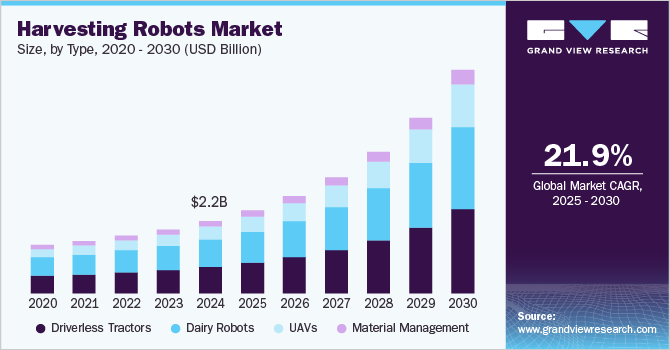Harvesting Robots Market Leverages Deep Learning for Better Crop Handling

The global harvesting robots market size was estimated at USD 2.24 billion in 2024 and is projected to reach USD 6.93 billion by 2030, growing at a CAGR of 21.9% from 2025 to 2030. This substantial growth is primarily driven by advancements in AI, machine vision, and sensor technologies that enhance robotic performance in agricultural applications.
Modern harvesting robots are increasingly adept at identifying ripe produce, navigating complex agricultural terrains such as orchards, and executing delicate picking tasks without damaging crops. The integration of deep learning and computer vision allows for real-time decision-making and adaptive behavior, broadening the applicability of these machines across various crop types. As these technologies become more reliable and cost-effective, their role in agricultural automation is expected to grow significantly.
Sustainable and precision agriculture practices are further accelerating the adoption of robotic harvesting solutions. These robots reduce waste, improve timing for optimal harvest, and minimize the use of heavy equipment that can compact soil and negatively impact the environment. Additionally, they generate valuable data on crop health, maturity, and yield forecasts, enabling better-informed farm management decisions and contributing to long-term sustainability.
The proliferation of controlled-environment agriculture (CEA) systems such as vertical farms and greenhouses is also fueling market expansion. These environments offer ideal conditions—consistent lighting, temperature, and spatial arrangements—that make it easier for robots to operate efficiently. In such settings, robots can perform repetitive tasks with high precision, alleviating the need for seasonal labor and enhancing both space and yield utilization. This trend is especially relevant in urban areas where land availability is limited, boosting demand for automated solutions.
Furthermore, precision farming continues to push for the integration of automation across agricultural processes. Harvesting robots align well with this model by supporting real-time monitoring, data-driven harvest management, and seamless integration with farm software systems. This synergy strengthens their value proposition within precision agriculture strategies.
Innovative business models like leasing and robotics-as-a-service (RaaS) are making robotic solutions more accessible to small and mid-sized farms. These models lower the financial barrier by allowing farmers to pay for usage rather than full ownership, expanding market reach to a broader user base. As these models mature and gain traction, adoption is expected to rise steadily across varying farm sizes.
Order a free sample PDF of the Harvesting Robots Market Intelligence Study, published by Grand View Research.
Key Market Trends & Insights
- North America accounted for over 36.0% of global revenue in 2024.
- The U.S. market is projected to experience continued growth during the forecast period.
- Driverless tractors led by type, capturing more than 37.0% of revenue in 2024.
- The semi-autonomous segment dominated by robot type in 2024.
- Outdoor farming environments constituted the largest segment in 2024.
Market Size & Forecast
- 2024 Market Size: USD 2.24 Billion
- 2030 Market Size (Projected): USD 6.93 Billion
- CAGR (2025–2030): 21.9%
- North America: Largest regional market
- Asia Pacific: Fastest-growing region
Key Harvesting Robots Company Insights
- Deere & Company, a major global player in agricultural machinery, has been pioneering the integration of robotics into farming. The company's autonomous 9RX tractor, launched at CES 2025, showcases the potential of AI and sensor-equipped machinery in performing tillage and cultivation tasks with no human intervention.
- AGCO Corporation, known for brands such as Fendt, Valtra, and Massey Ferguson, has made significant strides in autonomous farming. Its Fendt Xaver robot, designed for seeding and potentially harvesting, leverages Apex.OS to ensure advanced autonomous operations in the field.
- Emerging players like SPUDNIK Equipment Company LLC and FFRobotics are also shaping the market. SPUDNIK focuses on potato and vegetable harvesting with machines like the AirSep potato harvester, while FFRobotics develops robotic systems that mimic human fruit-picking techniques using AI and machine vision.
Key Harvesting Robots Companies
- Advanced Farm Technologies
- AGCO Corporation
- AgEagle Aerial Systems Inc.
- Clearpath Robotics Inc.
- Deere & Company
- FFRobotics
- Harvest Automation
- Kubota Corporation
- SPUDNIK Equipment Company LLC
- YANMAR HOLDINGS CO., LTD
Explore Horizon Databook – The world's most expansive market intelligence platform developed by Grand View Research.
Conclusion
The harvesting robots market is undergoing rapid transformation driven by technological innovation, precision agriculture, and the expanding appeal of automation across farming operations. As affordability improves and supportive service models become mainstream, robotic harvesting solutions are poised to become a cornerstone of modern agricultural practices—enhancing productivity, sustainability, and profitability for farms of all sizes worldwide.
- Art
- Causes
- Crafts
- Dance
- Drinks
- Film
- Fitness
- Food
- Games
- Gardening
- Health
- Home
- Literature
- Music
- Networking
- Other
- Party
- Religion
- Shopping
- Sports
- Theater
- Wellness


